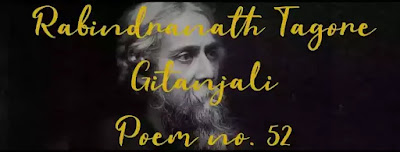Also Read
I thought I should ask of thee - but I dared not - the rose wreath thou hadst on thy neck. Thus I waited for the morning, when thou didst depart, to find a few fragments on the bed. And like a beggar I searched in the dawn only for a stray petal or two.
Ah me, what is it I find? What token left of thy love? It is no flower, no spices, no vase of perfumed water. It is thy mighty sword, flashing as a flame, heavy as a bolt of thunder. The young light of morning comes through the window and spreads itself upon thy bed. The morning bird twitters and asks, "Woman, what hast thou got?" No, it is no flower, nor spices, nor vase of perfumed water - it is thy dreadful sword.
I sit and muse in wonder, what gift is this of thine. I can find no place where to hide it. I am ashamed to wear it, frail as I am, and it hurts me when I press it to my bosom. Yet shall I bear in my heart this honour of the burden of pain, this gift of thine.
From now there shall be no fear left for me in this world, and thou shalt be victorious in all my strife. Thou hast left death for my companion and I shall crown him with my life. Thy sword is with me to cut asunder my bonds, and there shall be no fear left for me in the world.
From now I leave off all petty decorations. Lord of my heart, no more shall there be for me waiting and weeping in corners, no more coyness and sweetness of demeanour. Thou hast given me thy sword for adornment. No more doll's decorations for me!
Summary
In this lyric Tagore conveys the message of detachment from worldly pleasures but surely he isn't an escapist. He is a lover of life, although he agrees that visible phenomenon are only maya or illusion. If there is the desire of escape from ordinary life, it is only into the deeper life of mystical or religious experience rather than into some state of blissful oblivion.
The poet in the guise of lover of God expected the rose wreath, as a token of love from his beloved God. He was afraid of asking and hence waited till the morning, when the beloved left, to find that there were few pieces of the wreath on the bed. The poet assumed himself a beggar, begging for love of his Creator.
What he found was a mighty sword in place of flowers, spices and vase of perfumed water which symbolizes the luxuries, comforts of earthly life. The sword flashing as a flame and heavy as a thunderbolt symbolizes the spiritual courage and spiritual glow. The sword symbolizes a way to spiritual bliss. This spiritual strength, steadfastness gives power to fight against the evil within the human soul. The courage to resist against the worldly temptations, the detachment from worldly attractions can make your way to God easy and clear.
The poet is wondering at this gift of his beloved and he is a bit afraid of this gift as he is caught in earthly pleasures but soon he collects his strength, he makes this sword a source of his spiritual strength to fight against his weakness. With it he feels victorious. It will help him in fighting against the worldly strife. God has left death as his companion and he would fearlessly put the crown of his life at his head. He will welcome death fearlessly.
The virtue of detachment which was taught by Krishna in the Gita is revealed here. It is with the sword that man can severe the bonds that tie him to the world and do his duty fearlessly. This detachment from worldly bonds and pleasures makes a man enough strong to even face the death with welcome. Now the poet will be far away from petty trivialities. He will never wait and weep in corners for his lover. His coyness and sweetness of nature is now turned into the strength of character.
Critical Analysis
The path of spiritual love isn't easy and comfortable. It is too hard and full of strife as symbolized by the sword. The indifference to pleasure and pain, to comfort and luxury, to praise and blame of the world gives a way to spiritual bliss. The luxury, comforts, earthly relations, love for life all diverts man from the glorious path. The atmasamarpan in the feet of God after being detached from earthly pleasures will elevate the pleasure of meeting beloved, the God.
The traditional Vaishnav element is present in the lines where poet approaches God as a lover approaches his beloved as it is there in other songs of Gitanjali where poet has treated God as his father, king or lord.
Annotations
I waited for the morning: God is here compared to the lover who has come to spend the night with the beloved. Stray: detachment. Twitters: chirps. Frail: weak. Strife: struggle.
